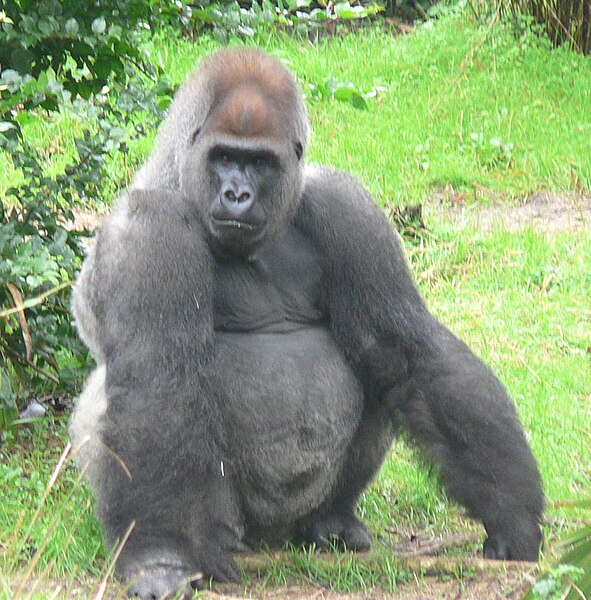As I have mentioned before, my sociological analytical starting point is human evolution. Human beings are social primates, adapted to gather and hunt in small groups of 20 to 50. (This number varies considerably with the precise environment in which these groups operate) Such an adaptive strategy requires close cooperation among the members of the group. To be efficiently exploited, food must be shared among members. Incapacitated members must be cared for, and children nurtured through an absurdly long period of helplessness. Individuals in a hunter-gatherer group must bond; they must identify as part the group and act on behalf of its members.
(This and unlabeled images from Wikimedia Commons)
But evolution is NOT "design", it's a statistical variation in the frequency with which certain genes are expressed. Natural selection doesn't have a "goal", it simply has a "direction". Once a trait leaves an organism slightly better at reproducing than models without the trait, that trait becomes more common in subsequent generations. Any "side effects" of the trait are irrelevant.
And so it is with human identity. Humans developed the ability to identify with a larger community because it was adaptive. But the reflex to identify with a group IS a reflex; it is triggered in any milieu in which there is an identifiable "us" and "them".
(Image from The Society Pages)
Consequently...
Each of us has multiple communities with which we identify.
Each of us has multiple identities.
This is illustrated with a simple thought experiment. On a piece of paper, answer the question "What am I?", using only nouns. These are your identities, or more accurately, your identity communities. They are groups of which you consider yourself a member. And membership has some important effects.
Group identity has both a "positive" and "negative" component. One must not only be able to identify fellow members of one's group, one must be able to identify non-members of the group. And once that particular distinction has been made, schematic processing takes over. Members of "our group" are automatically deemed to be more deserving, more virtuous, and more desirable than non-members; a phenomenon known as INGROUP BIAS. We give people with whom we identify the benefit of the doubt. We give them breaks we wouldn't give others. We look for reasons to excuse their behaviors. In the case of members of the in-group...
we want mercy. For outsiders, we want justice.
Groups are agents of socialization
We get our values from the groups with which we identify. The most important of these is our family. There are various mechanisms of socialization which transmit these values, and these values determine our behavior. These values are demonstrated by WHAT WE DO, not by what we say, or even by what we tell ourselves. A person may think of themselves as generous, but unless they behave in a generous manner, generosity cannot be said to be one of their values.
Furthermore, it is possible to discern how important a value is to a person by observing HOW it influences their behavior.
Someone whose name I can't remember proposed a "sacrificial scale" to determine the extent to which an individual ACTUALLY values something, as opposed to merely PROFESSING that they value something. The question it poses is this; "What would the subject sacrifice for the valued object?" The scale is:
- Life (Would the subject die for a Klondike bar?)
- Comfort (Would the subject really walk a mile for a Camel?)
- Finance (This has the advantage of being true ratio level data)
- Peace of mind (How much of their time is spent worrying about the particular object?)
- Verbal commitment (Will the subject publicly state that they value something, risking conflict or disapproval?)
It is really bothering me that I can't think of the inventor of the sacrificial scale. I learned about it from Dr. Richard Cottam, but I don't think it was his invention. I'll post an update here after I go through my 20 year old grad school notes.
Anyway...
Our behavior is determined by our values, and we derive our values from the groups with which we identify.
However, as I pointed out earlier, we identify with multiple groups. We are Baptists, and Farmers, and Republicans, and Tar Heels fans, and members of the NRA. At least, some people are. I don't think any of them read this blog, though.
And the values held by our identity groups are different. They may even conflict. When they conflict, how can they be said to determine our actions?
Identity is contextual.
"Where you stand depends on where you sit" is an old cliche that describes the accommodation we make when our values conflict with each other. Each of us possesses multiple identities. But only one of those identities is SALIENT at any given moment. The salient identity is determined by the social CONTEXT we are in at any given moment. I like to think of myself as a "scientist". This identity comes with certain values; including materialism, rationality and objectivity.
But I am also a parent. There is absolutely no objective way that my two kids are the smartest, coolest, most talented people on the planet. The statistical likelihood that there are better people than my kids, in a world of 6.9 billion people is extremely high. As a "scientist", I know this, with an absolute certainty.
But I am only a scientist in the context of doing social analysis. All I have to do is look up from this desk, to a picture of my kids...
and the context changes, my identity changes from "scientist" to "parent" and I know, with an equally absolute certainty that my kids are the smartest, coolest, most talented people in the world. And, extraordinarily good looking.
(Images from the top of my bookcase. They're going to be PISSED.)
Discussing my kids brings us to the subject of elites within groups. ANY group of people, allowed to interact and coalesce, will inevitably split into elite members and mass members. This has its origins in the fact that we are social primates. Every primate social group forms dominance hierarchies. This is as true for human beings as it is for chimpanzees.
The impulse to rise, to dominate, to achieve status is stronger in some individuals than it is in others. This results in a sorting process whereby "alpha" members of the group begin to exert influence within the group, and on the group's actions as a whole. When that influence surpasses the influence exerted by the modal member of the group, the "alpha" individual can be said to be an elite member of the group.
Appropriate dominance behaviors in people are sometimes different from those in other primates. Ambitious individuals in human groups rise to elite status by epitomizing the values of the salient group. Their behaviors are more congruent with, and more expressive of, the group's values than those of the mass membership.
In a group of bond traders, elite members will make more money than mass members. In a church, elite members will attend services and tithe more than mass members. In a country club, elite members will serve on committees and use facilities more frequently than mass members.
It is important to relate this expression of group values to the sacrificial scale discussed above. In general, elite members devote more time and money to the group than mass members. And this also relates to the socialization function of groups; the value socialization process tend to flow from elites to the mass membership, with alphas in the mass membership adopting those values more thoroughly, and holding them more intensely as they rise to elite status.
But the elite members at the top of a group themselves constitute a group, with which the individual members identify. The same group dynamics which apply to the group also apply to the elite subgroup at the top of the dominance heirarchy, including ingroup bias. Over time, this leads elites to value their status within the group more than the purported values of the group. This is known as the Iron Law of Oligarchy.
And this has profound implications for the American Political System.
(image from my hackish skills with Google Draw)
their behaviors are predictable, as are the political consequences of those behaviors.
The relevant groups within the American Political System are:
- The Mass Populace, whose dominant value is inattention
- Big Business, whose dominant value is profit maximization
- Political Parties, who seek to win control of the apparatus of the State
- Politicians, who are single-minded seekers of reelection
- Bureaucrats, who are single-minded seekers of career advancement
I hope to explore the system in some detail in later blog posts.








KSAC is one of the most trusted Ayurvedic Treatment for Neck Pain in Hyderabad. For over two decades, we provides 100% Evidence based Treatments for diseases, naturally
ReplyDeleteI always visit new blog everyday and i found your blog.;”;“ Курсы английского Днепр
ReplyDeleteAyurHarsha is The Best Ayurvedic Hospital in Hyderabad>, Kothapeta. It can cure Diseases in an effective way with effective Ayurvedic Medicines.
ReplyDelete